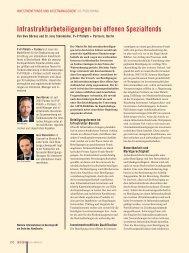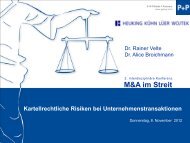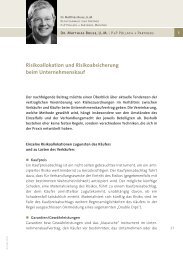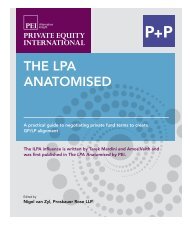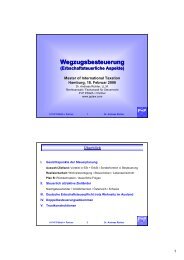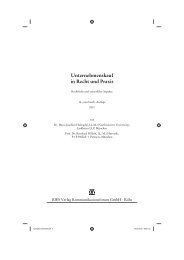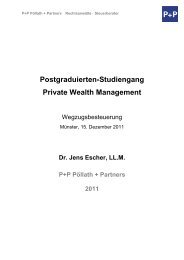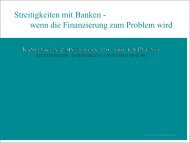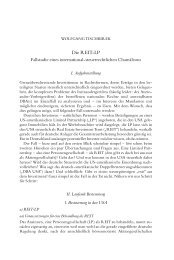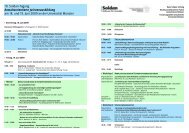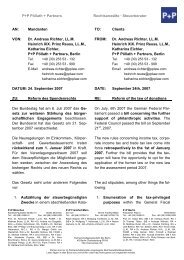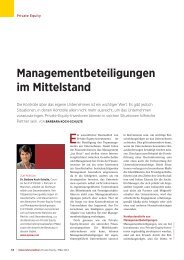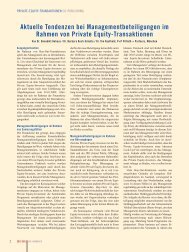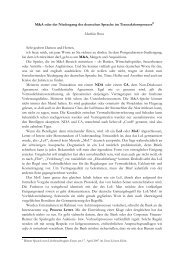Investissements étrangers en Allemagne Foreign Investments in ...
Investissements étrangers en Allemagne Foreign Investments in ...
Investissements étrangers en Allemagne Foreign Investments in ...
Create successful ePaper yourself
Turn your PDF publications into a flip-book with our unique Google optimized e-Paper software.
Possibilités d’<strong>in</strong>vestissem<strong>en</strong>t<br />
Investm<strong>en</strong>t Possibilities<br />
II. Achat dediffér<strong>en</strong>ts types d’actions II. Acquisition of Various Share Types<br />
1. Société à Responsabilité Limitée<br />
(GmbH pour Gesellschaft mit beschränkter<br />
Haftung)<br />
1. Private Limited Liability Company<br />
(GmbH)<br />
7<br />
a) Généralités a) G<strong>en</strong>eral<br />
La GmbH est de lo<strong>in</strong> la forme sociétaire la plus<br />
courante <strong>en</strong> <strong>Allemagne</strong>. Selon les statistiques<br />
actuelles, un million <strong>en</strong>viron d’<strong>en</strong>tités commerciales<br />
revêt<strong>en</strong>t la forme de GmbHs (sociétés à responsabilité<br />
limitée ou SARL). L’un des pr<strong>in</strong>cipaux<br />
avantages d’une GmbH est que les associés ne<br />
sont pas t<strong>en</strong>us personnellem<strong>en</strong>t responsables des<br />
dettes de la société. Toutefois, la création d’une<br />
GmbH, a<strong>in</strong>si que les augm<strong>en</strong>tations decapital et<br />
les cessions d’actions exig<strong>en</strong>t la certification d’un<br />
notaire.<br />
b) Capital social b) Share Capital<br />
Le capital social doit être fixé dans les statuts et<br />
doit être d’un montant m<strong>in</strong>imum de 25 000 EUR.<br />
Avant la réforme de 2008 de la Loi sur les sociétés<br />
àresponsabilité limitée (GmbHG), chaque actionnaire<br />
n’était autorisé qu’à souscrire une seule action<br />
de la société et chaque action devait avoir un<br />
montant m<strong>in</strong>imum de 100 EUR et être divisible par<br />
50. La réforme delaGmbHG aoctroyé aux actionnaires<br />
une bi<strong>en</strong> plus grande souplesse concernant<br />
les montants de leurs apports. Les actionnaires<br />
peuv<strong>en</strong>t désormais souscrire autant d’actions qu’ils<br />
le souhait<strong>en</strong>t et ces actions doiv<strong>en</strong>t être d’un montant<br />
d’au mo<strong>in</strong>s un euro. Cette nouvelle souplesse<br />
a notamm<strong>en</strong>t simplifié l’achat d’actions si un actionnaire<br />
al’<strong>in</strong>t<strong>en</strong>tion de ne v<strong>en</strong>dre qu’une partie de<br />
sa part, a<strong>in</strong>si que les jo<strong>in</strong>t v<strong>en</strong>tures et les programmes<br />
de participation de la direction.<br />
The form of aGmbH isbyfar the most frequ<strong>en</strong>tly<br />
used corporation form <strong>in</strong> Germany. Accord<strong>in</strong>g to<br />
curr<strong>en</strong>t statistics, around one million commercial<br />
<strong>en</strong>tities are organized as GmbHs. One of the ma<strong>in</strong><br />
advantages of aGmbH is that the shareholders<br />
are not personally liable for the company’s debts.<br />
However, foundations of a GmbH, as well as<br />
capital <strong>in</strong>creases and share transfers, require<br />
notarization by anotary public.<br />
The nom<strong>in</strong>al share capital must be determ<strong>in</strong>ed <strong>in</strong><br />
the articles ofassociation and shall amount to a<br />
m<strong>in</strong>imum of EUR 25,000. Before the 2008 reform<br />
of the Limited Liability Companies Act (GmbHG),<br />
each shareholder was only permitted to subscribe<br />
to one share <strong>in</strong> the company and each share was<br />
required tohave am<strong>in</strong>imum amount of EUR 100<br />
and be divisible by 50. The 2008 reform of the<br />
GmbHG granted shareholders much greater flexibility<br />
regard<strong>in</strong>g the amounts of their contributions.<br />
Shareholders are now <strong>en</strong>abled to subscribe toas<br />
many shares asthey wish and such shares have<br />
to be d<strong>en</strong>om<strong>in</strong>ated <strong>in</strong> an amount of at least one<br />
Euro. This new flexibility has particularly simplified<br />
the purchase of shares ifashareholder <strong>in</strong>t<strong>en</strong>ds to<br />
sell only apart of his stake, aswell asjo<strong>in</strong>t v<strong>en</strong>tures<br />
and managem<strong>en</strong>t participation programs.<br />
c) Ma<strong>in</strong>ti<strong>en</strong> du capital social c) Ma<strong>in</strong>t<strong>en</strong>ance of Share Capital<br />
La GmbH prévoit le ma<strong>in</strong>ti<strong>en</strong> du capital social àce<br />
niveau dans lamesure oùiln’est pas permis de<br />
faire des distributions aux associés si les actifs<br />
restants (évalués àleur valeur comptable) risqu<strong>en</strong>t<br />
de ne pas couvrir pas lecapital social et le passif<br />
de la société. En d’autres termes, seuls les réserves<br />
disponibles et les bénéfices non répartis<br />
peuv<strong>en</strong>t être distribués aux actionnaires. La réforme<br />
de 2008 de la GmbHG a ré<strong>in</strong>stauré<br />
l’approche « bilancielle » traditionnelle <strong>en</strong> vue de<br />
déterm<strong>in</strong>er si une transaction effectuée <strong>en</strong>tre un<br />
actionnaire et une GmbH affecte son actif net et<br />
constitue donc une distribution. Une telle approche,<br />
et a<strong>in</strong>si la possibilité d’effectuer des transactions<br />
neutres quant au bilan, tels les systèmes dec<strong>en</strong>tralisation<br />
de trésorerie, a<strong>in</strong>si que les valeurs mobilières<br />
<strong>en</strong> amont dans le cadre des rachats<br />
The GmbHG provides for the ma<strong>in</strong>t<strong>en</strong>ance of the<br />
nom<strong>in</strong>al share capital <strong>in</strong>sofar as it is not permitted<br />
to make distributions to shareholders if the rema<strong>in</strong><strong>in</strong>g<br />
assets (at book value) would not cover<br />
the company’s share capital and its liabilities. In<br />
other words, only free reserves and accumulated<br />
profits are allowed tobedistributed toshareholders.<br />
The 2008 reform of the GmbHG re<strong>in</strong>stated the<br />
traditional “balance sheet-based” approach of<br />
determ<strong>in</strong><strong>in</strong>g whether a transaction betwe<strong>en</strong> a<br />
shareholder and a GmbH affects its net assets<br />
and therefore constitutes a distribution. Such<br />
approach –and thereby the permissibility of balance<br />
sheet-neutral transactions such as cash<br />
pool<strong>in</strong>g systems, aswell as upstream securities <strong>in</strong><br />
connection with leveraged buy-outs – had be<strong>en</strong><br />
questioned byadecision of the German Federal



